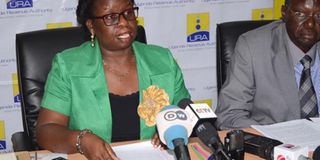We need Shs140b to collect more taxes, URA tells government

The commissioner general, Uganda Revenue Authority, Ms Doris Akol speaks at an earlier event in Kampala recently. Looking on is an officer from URA. Ms Akol said URA wants Shs140b to be able to collect more taxes. FILE PHOTO
What you need to know:
- While addressing Members of Parliament earlier on the theme ‘Domestic revenue mobilisation – the pathway to economic sustainability and self-sufficiency’ at the same venue, Ms Akol said URA has since the beginning of this financial year collected Shs3.5 trillion which represents 14.2 per cent.
- In total Ms Akol said the URA register now has 954,000 taxpayers but pointed out that they still need to reach more people.
- Collection statistics. The revenue body collected Shs2.46 trillion in the first three months of the financial year from July 2015, short of the Shs2.5 trillion target over the same period. According to the authority, the deficit was due to the poor performance of domestic taxes that stood at Shs1.3 trillion against a target of Shs1.36 trillion.
Kampala. In order to meet the target of collecting 16 per cent tax ratio to the Gross Domestic Product (GDP), Uganda Revenue Authority (URA) says government needs to avail it with Shs140 billion to make massive investments needed to put in place all the necessary infrastructure and systems.
As it aims at achieving the middle income status by 2020, government has stated in the National Development Plan that Uganda’s domestic tax ratio to GDP has to rise to 16 per cent per annum over the next four years to drive the country’s economic development.
In an interview with Daily Monitor last Friday at Kampala Serena Hotel, the commissioner general URA, Ms Doris Akol, said: “We have drawn up a budget of Shs140 billion for various investments we want to make at URA to be able to collect more taxes to meet the 16 per cent target set by the government in next four years.”
Ms Akol said URA needs to make investments in IT infrastructure and compliancy mechanism by strengthening electronic tracking devices; open up more offices in Kampala and up country; and increase the staff.
“URA has about 2,400 staff; one staff handles 7,000 payers on average. This is heavy work load for one person to do his or her work effectively. In other places we don’t have offices to reach out to the general public and collect tax,” she said.
Without increasing funding to URA, she said it will be difficult for the tax collector to achieve the target that has been set.
While addressing Members of Parliament earlier on the theme ‘Domestic revenue mobilisation – the pathway to economic sustainability and self-sufficiency’ at the same venue, Ms Akol said URA has since the beginning of this financial year collected Shs3.5 trillion which represents 14.2 per cent. She also said they have registered 35,338 new tax payers which is a 3.92 per cent growth.
In total Ms Akol said the URA register now has 954,000 taxpayers but pointed out that they still need to reach more people.
“We believe that when URA is strong we will be able to collect more revenue,” she said.
The Speaker of Parliament, Ms Rebecca Kadaga, said URA needs to engage more with the public to be able to collect more tax. She also called on URA that to guard against staff stealing revenue collected from taxpayers.
Ms Kadaga also said: “Government should avail money to URA to increase on the number of scanners at the border post because government is losing tax revenue since some imported goods enter the country without being noticed.”
The large tax payers who consist of the multinational companies and others contribute more than half Uganda’s domestic tax collections.
However, the West Budama North legislator, Othieno Okoth, said the taxes the multinational companies such as telecoms and oil companies give in form of taxes are generated by the ordinary men and women in the country who use their services; observing that: “We need to move away from direct tax to indirect taxes such that many people can be able to taxes.”
However, the commissioner tax policy in the ministry of Finance, Mr Moses Kagawa, said the issues of introducing indirect tax system in Uganda is debatable. “We shall continue to be dependent on direct tax because of the nature of Uganda’s economy,” he said.
The chairperson Budget Committee in Parliament, Mr Amos Logolobi, said Uganda’s tax base to the GDP is still very low compared to other countries in the region and the sub-Saharan African level of 22 per cent.
“We (Parliament), ministry of Finance and URA have explored all the means of expanding Uganda’s tax but we are still struggling to rise tax ratio to the GDP of 16 per cent the target that government has set,” he said.
Commenting on tax exemption to specific areas such as agricultural inputs and human medicine, Mr Logolobi said: “There is need to reexamine the exemption/incentives. Consumers have not benefited from tax exemption in agricultural chemicals and in human medicines because the prices are high as if there is tax charged on these items.”
The commissioner customs URA, Mr Dickson Kateshumbwa, said 43 per cent of Uganda’s revenue comes from the international taxes. “However, the challenge we have is that only 26 per cent of imports are dutiable due to common external tariffs based on the existing regional trade agreements,” he said.
Mr Kateshumbwa also revealed that 70 per cent of the cargo comes into the country without being checked due to under staffing and equipment.
The acting commissioner domestic taxes URA, Mr Silaj Kanyesigye, said URA has only 25 offices for domestic taxes in the whole country. “Nine per cent of the revenue is filled by tax agents,” revealing that URA is contemplating starting to license tax agents to collect tax on its behalf.




